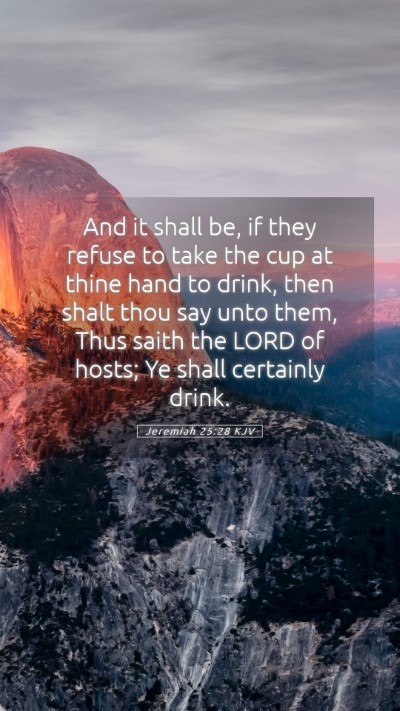Bible Verse Commentary: Jeremiah 25:28
Context of the Passage: Jeremiah 25:28 is set within a broader prophetic context where God conveys His impending judgment upon the nations for their sinfulness. Jeremiah, a prophet during a tumultuous time in Israel’s history, is tasked with delivering messages of warning and hope to a people who have strayed from God's ways.
Understanding Jeremiah 25:28
This verse states:
“But if they refuse to take the cup from your hand to drink, tell them, ‘This is what the Lord Almighty says: You must drink it!’”
In this verse, God instructs Jeremiah on how to communicate to those nations that they will inevitably faceHis judgment. This drinking of the cup symbolizes the acceptance of God’s judgment.
Bible Verse Meanings from Public Domain Commentaries
Matthew Henry’s Commentary
Matthew Henry emphasizes the seriousness of the judgment being pronounced. He points out that refusing to acknowledge God’s warning leads to inevitable consequences. The cup signifies the wrath of God, which these nations cannot escape. Henry also highlights God's sovereignty in dispensing justice to both His people and the surrounding nations;
Albert Barnes’ Notes on the Bible
Albert Barnes elaborates further on the concept of the 'cup' which represents not just divine wrath but the entirety of God's judgment upon sin. In his exposition, Barnes notes that the refusal to drink symbolizes the persistent defiance of nations against God's authority. This refusal leads them to face the fullness of God's planned judgment, reinforcing the idea that all nations must ultimately respond to God's call.
Adam Clarke’s Commentary
Adam Clarke provides insights into the metaphor of the 'cup' as shaped by ancient customs where drinking from a cup often signified acceptance of fate. Clarke elaborates on the cultural implications of this metaphor, suggesting that it calls into question the attitude of nations toward their judgment. He notes that God's patience runs thin, and when nations reject divine warning, they seal their fate for divine retribution.
Biblical Exegesis
Jeremiah 25:28 utilizes powerful imagery to convey the weight of the message from God to nations distant in both geography and faith. The verse serves as a dire reminder that one cannot simply ignore divine mandate and expect to be free from repercussions.
Key Themes and Insights:
- Divine Judgment: The verse encapsulates the theme of God's impending judgment over nations for their misdeeds and refusal to recognize His authority.
- Sovereignty of God: It highlights God's ultimate control over all nations, reinforcing the belief in His power over earthly kingdoms.
- Rejection of God's Word: The passage warns against the consequences of ignoring divine revelation, portraying such refusal as a serious offense with consequences.
Prayer and Reflection
As readers reflect on Jeremiah 25:28, it's vital to consider personal acceptance of God's messages in our lives. Just like nations faced the prospect of drinking from the cup, individuals today are also called to recognize and respond to God's leading.
Related Bible Cross References
- Isaiah 51:17: Another reference to the cup of God’s wrath.
- Revelation 14:10: The consequences of refusing to heed God’s warnings.
- Ezekiel 23:31-34: The symbolism of drinking from the cup as a sign of judgment.
Conclusion
Jeremiah 25:28 offers profound understanding about God's judgment and the serious nature of rejecting divine instruction. The exploration of this passage is not just an academic exercise but also necessitates personal introspection regarding how we respond to God's call in our own lives.
For those engaged in Bible study groups or online Bible study, this passage serves as a foundational text for discussions about God’s justice and mercy. Utilizing various Bible study tools and resources can further enrich one's understanding and application of such scriptures in everyday life.
As believers strive for a greater understanding of Scripture, approaching difficult passages with earnest inquiry and community discussion can lead to deeper insights and appreciations of God’s plans as communicated through His Word.


